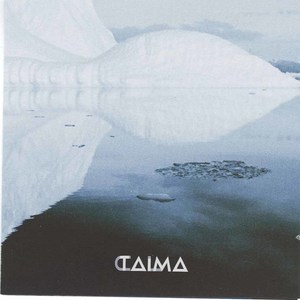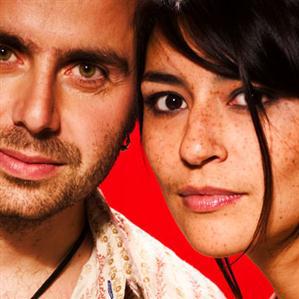Taima
Websites:
http://www.taimaproject.com/english/index.shtml
Origin:
Salluit, Québec (Elisapie Isaac); Rouyn-Noranda, Québec (Alain Auger)
Biography:
Elisapie Isaac was adopted at birth by an Inuit family and was raised according to Inuit tradition. She also kept close ties with her biological parents – an Inuk mother and a father from Newfoundland. The “mix of cultures” she experienced as a child soon gave her the desire to travel, to take risks and to express the duality she carried within her. In a land of vastness, of intense cold and of cultural constrasts, Elisapie learned to pace her life to nature’s own rhythm: hunting seasons, bird migration, endless sunlight or months-long nights all became a part of her, just as she embraced Inuit tradition as well as some aspects of contemporary culture. In this fragile equilibrium between light and darkness, between old and new, she found her own destiny: communication.
Music was always a part of her. As a child, she repetitively sang the religious hymns learned in church, for her mother wanted her to know them by heart. At 14, her uncle invited her to join the Salluit Band (a folk-rock-gospel group that recently celebrated its 40th birthday) as a chorist. She accepted the invitation... but since singing wasn’t part of her career aspirations at the time, she left the band to concentrate on her real passion: communications.
At 15, she was the host and producer of a radio show for teenagers broadcasted by TNI in Salluit. She was never idle, filling her summer schools breaks with communications-related jobs – either as a tv-show host and journalist, or as a liaison and counselor for teens in Salluit and Kuujjuaq.
She left her homeland in 1999 to pursue her communications studies at Montreal’s John Abbott College. In 2000, she acted as host and journalist for Peoples of the Circumpolar, a documentary produced by TPI, an Inuit production company. Her work on the film allowed her to visit many regions of the Circumpolar – such as Norway, Siberia, Greenland, Alaska and Canada’s Great North. This travel experience turned out to be a defining moment of her career, as she developed the need to share her deep attachment to her culture through art.
Folk music, for the unparalleled emotions and beautiful sense of intimacy it carries, strongly attracted Elisapie. Her interest in this genre revived her singing ambitions, pushed her to write songs and to seek a musician who would add dimension to her words. She met Alain Auger in July 2000 – and you know the rest...
In 2001, Elisapie won the Fourth “First Nations Filmmaker” Award presented by the National Film Board (NFB) of Canada – which allowed her to direct Sila piqujipat (If The Weather Permits), a short film that will premier worldwide in March 2003.
Simplicity and authenticity are at the core of Elisapie’s creative process. In her writing as in her singing, she shares the emotions of a woman who profoundly bonds with the world around her. Life perpetually pulsates; love feeds everything; the heart speaks the language of her people's Wisemen; and The Mother, mythic figure, is primeval.
Alain Auger was born and raised in Rouyn-Noranda, a town located in Abitibi, his parents’ homeland. The youngest of five music-loving children, he was introduced to legendary and visionary bands such as Genesis (the original!), Pink Floyd, Rush, Supertramp, The Police and Marilion at a very early age. Alain took his first electric guitar lessons at the age of 15. In 1987, he enrolled in the classical guitar program at Vincent d’Indy School, where he learned to read music. Following the advice of his music teacher, he then moved to Montreal in 1989 to study jazz guitar and latin percussions. This new and stimulating “multicultural” avenue opened up a world of musical diversity that Alain still explores to this day with ever-increasing curiosity.
During the last of his three years at cégep Saint-Laurent, he followed an intensive program on jazz arrangements for Big Band. During the same period, Luc Boivin invited him to join El Extasis, a percussions collective.
Alain’s first viewing of The Big Blue (Le Grand Bleu), a film by French director Luc Besson, was the catalyst of his career as a composer. He was fascinated by the intimate complicity between image and music displayed in the movie – and wanted to create musical environments that would complement other art forms in the same way. He went on to compose the musical score for Jacques et la soumission from Ionesco, a play presented by the cégep Saint-Laurent theater troup.
After his studies, Alain played in various bands that embraced many styles, from jazz to blues, R&B, funk and latin. He saw Baraka, a movie by Ron Fricke, while on tour. The film turned out to be another revelation. The subject-matter of the movie – a portrayal of Man in various contexts and a representation of his relations to his environment – mirrored Alain’s vision of the world. To him, the musical score represented an essential and integral part of the movie: in Baraka, music acted as a language, transporting the viewer beyond geographical frontiers, bringing down all barriers without a word being uttered. In a flash, Alain gave his career a new direction. He moved away from the bar scene and spent the next 2 years putting together his own studio, where he further defined his musical personality and created a demo track of his own movie scores. This new direction offered him endless possibilities as a musician: artistic freedom; the occasion to explore and use various musical styles; and the possibility to create musical contrasts, to share his philosophy of humanity and his vision of a better society.
Pam Grier provided his first work opportunity within the film industry. The Afro-American actress who interpreted Jackie Brown in the eponimous film Quentin Tarantino (and long-time collaborator of Quincy Jones) was in Montreal for the shooting of Rod Hewitt’s Strip Search. She loved Alain’s demo and passed it on to Hewitt, who then asked Alain to write a few songs for his movie. They collaborated again for Back to Even, a film entirely produced in Los Angeles. Alain has since composed about a dozen movie scores, as well as numerous theme songs for advertisement campaigns and television, radio and theater productions.
A return to live performance always attracted him, but only if it was to be a personal project. He was therefore on the lookout for a co-creator, an accomplice who would understand his goals. Elisapie was that person. Taima Project really took off in 2001, after Alain’s return from a three-month humanitarian mission in Senegal with Club 2/3, a Montreal-based NGO.


